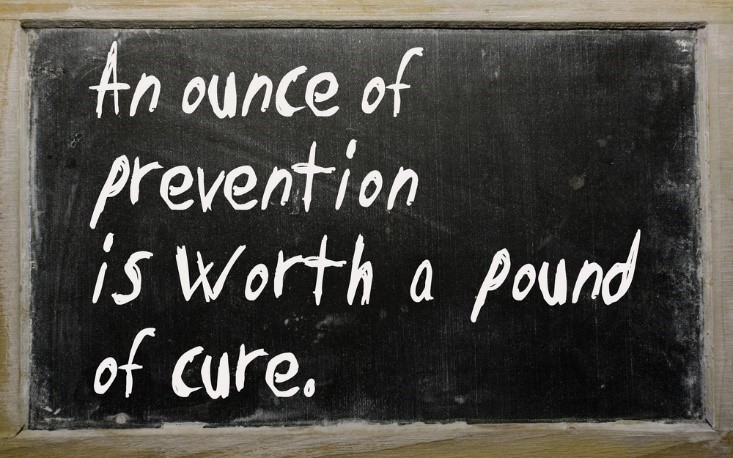Digital Health Futurist Maneesh Juneja explores whether personalised prevention should be getting more attention than it is.
We are increasingly hearing more about Personalised Medicine.
“The right patient with the right drug at the right dose at the right time”, says the FDA website. The UK is being hailed as a pioneer after announcing the 100,000 Genomes project in 2014, which has the potential to revolutionise medicine. In terms of treating cancer in the future, this project puts us one step closer towards the dream of personalised medicine. Professor Jeremy Farrer, head of the Wellcome Trust said,
“20 years from now there will be therapies, instead of chemo, that will be a much more targeted approach to treatment.”
Last week, President Barack Obama called for a national personalised medicine initiative in the US during his State of the Union speech. These are fantastic ambitions and to be applauded.
However, what if we could prevent diseases like cancer in the first place? Where are the major initiatives around personalised prevention?
At the end of 2014, I attended the inaugural Challenges of our Era Summit in London, with organisations such as NASA, USAID, Nesta and The Gates Foundation being involved in putting on the Summit. It was aimed at stimulating innovation at a global level in 4 key areas:
- Empowering Women and Girls
- Access to a Connected World
- Reducing the risk of developing cancer
- The survival of the oceans
It wasn’t just an ordinary conference where one passively sits in the audience receiving information—it had a practical side too. The afternoon had workshops, where attendees formed teams to come up with challenge statements that could potentially be refined as defining a future Challenge Prize. The workshop I was in, ‘reducing the risk of developing cancer’ was chaired by Esther Dyson, founder of HICCup and Professor Linda Bauld from the University of Stirling.
We learnt that, based upon Cancer Research UK’s research, 4 out of 10 cases of cancer could be prevented, through changes to lifestyle. We’re talking about risk factors that can be modified—such as smoking, weight, fruit/vegetable consumption and alcohol consumption.
During the workshop, the discussion at our table concluded that the NHS in the UK doesn’t focus enough on prevention, and that perhaps if we wanted to stimulate radical ideas to reduce the risk of developing cancer, it might be too difficult to pilot within the NHS, and would have to be done outside the current system. We’d need a parallel system—an NHS2, or a National Wellness Service—one firmly focused on prevention.
The experience during the Summit really got me thinking about prevention, and I came across a superb blog post by Dr. Alisha Davies. She argues that the NHS needs to do more about prevention. Here are a couple of statistics cited in the post:
- 70 percent of the NHS budget is spent on long term conditions
- 4 percent of the total healthcare budget is spent on prevention
Is this simply a result of the ‘wall’ between medicine and public health? Or is this because there is little or no profit in preventing long term conditions? The cynics amongst us may even believe the UK government is not that interested in people giving up smoking, since they get more income from tax on tobacco sales vs the cost to treat smoking related illnesses on the NHS.
Davies cites evidence in her blog post that preventative interventions have been found to be cost effective. An article from the US suggests that preventative care doesn’t always save money, and the smart thing would be to target preventative care at those most at risk of developing a chronic disease.
So what about personalised prevention, and can the emerging era of Digital Health play a role?
I think back to my days working in marketing analytics with various organisations, and how the team would use a database of customer transactions to profile customers, segment them, and ultimately use all of that information to predict who would be most likely to respond to a particular marketing campaign. The campaign would be targeted to the needs of each customer segment in order to maximise the response rate.
Why aren’t we doing that with prevention?
Instead of generic messages about eating more fruit & vegetables or being more active, why aren’t we using data to target those most at risk with personalised, relevant and timely messages?

In 2014, I read of an idea from Public Health England (PHE), which would involve giving their algorithms to supermarkets which would automatically determine the sugar and fat content of the items in a customer’s shopping basket. Duncan Selbie, Chief Executive of PHE, said
“What if we gave Sainsbury’s the algorithms that they could personalise to their customer database, so they give their customer base advice about how they could improve their health?”
Now, imagine if when you’d finished your shopping at the supermarket, the cashier handed you a receipt which highlighted that you regularly buy breakfast cereals that are high in sugar and low in fibre. Imagine if the cashier also handed you discount coupons for breakfast cereals that are low in sugar and high in fibre. Would you welcome that ‘nudge’ towards making healthier choices?
In last year, I’ve written and talked about the concept of smart vending machines. Most people told me they wouldn’t feel comfortable with a machine limiting their choices. Well, a UK company has produced the world’s first vending machine with facial recognition technology that can be linked back to a database. The article states,
“The machines are able to identify and greet a user, remember a person’s preferences and even refuse to vend a certain product based on a shopper’s age, medical record, dietary requirements or purchase history.”
I wonder, is this invention useful for personalised prevention? Can you envisage a world where the vending machine denies you the choice of buying a chocolate bar because your medical records indicate you have impaired glucose tolerance?
Who might drive personalised prevention? Will it be the insurers like Generali, who are the first insurer in Europe to link lifestyle data from an app and wearables to health insurance rates? Is the reward of cheaper health insurance next month the key to making you decide to increase your physical activity levels?
I chatted with Dr Keith Grimes recently, who is a GP in England. He mentioned an idea where we’d opt in to Google helping us be more physically active. For example, when searching for the location of your next meeting in Google Maps, perhaps the longest walking options would be at the top of the options available?
The latest WHO status report on noncommunicable diseases (NCD) mentions that out of the 38 million deaths globally from NCDs in 2012, more than 40% were premature, and the majority of premature NCD deaths are preventable.
“Prevention, public health and public policies are the most effective responses to reducing NCDs without blowing health-care budgets,” writes Dr. Alessandro Demaio in a superb post.
So when there is so much existing data about us, and more data likely to be generated and captured in years to come, I wonder why personalised prevention isn’t hitting the headlines like personalised medicine. Or perhaps prevention is boring—because as Dr. Richard Smith highlights,
“It’s all about what doesn’t happen rather than what does.”
Perhaps we as citizens don’t want to be told how to live our lives. Do we really want to live in a world where our daily choices are governed by algorithms, rather than our emotions?

Encouraging people to lose weight, drink less or be more physically active, with a view to playing a part in preventing NCDs such as diabetes or heart disease is just one aspect. We need to really have a deeper look at how we live, work and play in society.
Even if personalised prevention would aim to help us walk more, what if the neighbourhood we live in is not safe to walk around at night? Are fresh fruit and vegetables affordable for every family in the country? Can we really expect people in England to drink less alcohol, now that £1 pubs have opened? Could our school systems be putting people off sport and physical activity for life?
Dr Rupert Dunbar-Rees, CEO of Outcomes Based Healthcare, reckons we’re close to redefining what ‘prevention’ means. He told me,
“By using big data—more specifically applying non-health data to health outcomes data—I believe that we are about to move far beyond personalised prevention, and into 'pre-treatment' of health conditions, in much the same way as Amazon is planning to 'pre-ship' items to customers before they have even bought them.”
What do you think? Are concepts such as ‘personalised prevention’ and ‘pre-treatment’ the way forward?
Do we need to demand that personalised prevention gets as much attention (and funding) as personalised medicine?
In the 21st century, are we really doing enough to prevent the children of today from becoming the patients of tomorrow?
For further information about Maneesh Juneja, take a look at his website maneeshjuneja.com or find him on Twitter @maneeshjuneja.
The nuviun blog is intended to contribute to discussion and stimulate debate on important issues in global digital health. The views are solely those of the authors.

